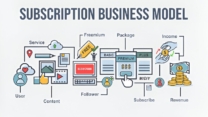
The Power of Niche Marketing: Unlocking Untapped Potential in a Crowded Market
In today’s fiercely competitive business environment, the conventional wisdom of appealing to everyone often leads to the paradoxical outcome of connecting with no one. Businesses, especially startups and smaller ventures, face an uphill battle for attention in a content-saturated world. However, there’s a highly effective and strategic counter-movement gaining significant traction the power of niche marketing. This isn’t just about finding a smaller slice of the pie it’s about meticulously identifying and serving a specific audience so precisely that your brand becomes their ultimate, automatic solution.
What Exactly is Niche Marketing?
At its core, niche marketing involves targeting a well-defined, specialized segment within a broader market. Instead of attempting to satisfy the needs of the general public, you hone your products, services, and messaging to cater to a distinct group with unique characteristics, interests, desires, or unresolved problems. Think of it as becoming the undisputed expert and go-to resource for a specific, often underserved, community.
Why the Power of Niche Marketing is Undeniable
The advantages of embracing a niche strategy are profound and far-reaching, transforming how businesses engage with their customers and compete in the market.
- Reduced Competition & Increased Market Share: By focusing on a specialized segment, you inherently avoid the crowded battlegrounds of mainstream markets. This allows you to stand out as an expert, build strong brand loyalty, and command a larger share within your specific segment. Studies show that high-growth firms are significantly more likely to adopt niche marketing strategies.
- Deeper Customer Connections & Loyalty: When you truly understand your niche audience’s specific pain points and desires, you can craft highly relevant messaging and products that resonate deeply. This fosters genuine emotional connections, leading to increased customer loyalty and advocacy. Users consistently spend more time engaging with niche websites, indicating a deeper level of interest and trust.
- Premium Pricing Potential: Because your product or service precisely addresses a specific need, customers are often willing to pay a premium for your expertise and tailored solutions. This targeted value proposition often results in higher conversion rates on niche e-commerce platforms compared to broader marketplaces.
- Enhanced Brand Authority & Trust: By consistently delivering specialized solutions and becoming the authoritative voice within your chosen niche, you establish undeniable credibility. Consumers increasingly trust niche experts for specialized product recommendations, solidifying your brand’s position as a reliable resource.
- Optimized Resource Allocation: Niche marketing allows for laser-focused resource deployment. Instead of dissipating your budget across a vast, undifferentiated audience, you can direct your marketing efforts, product development, and customer service towards the segment most likely to convert and become loyal customers. This leads to higher Return on Investment (ROI) and greater operational efficiency.
Niche as a Launchpad for Flexible Innovation
Beyond the well-known benefits, the power of niche marketing lies in its unique ability to serve as a dynamic launchpad for future innovation and strategic flexibility. Many businesses view a niche as a limiting factor, fearing pigeon-holing. However, the opposite is often true:
By mastering a specific niche, you gain unparalleled, granular insights into a distinct customer group. This deep understanding allows for:
- Agile Product/Service Iteration: You can quickly test, refine, and innovate offerings tailored to precise needs without the complexity of pleasing a mass market. This rapid feedback loop allows for quicker pivots and more effective product development.
- Organic Expansion into Adjacent Niches: Once you’ve become the dominant player and trusted authority in one micro-community, you possess the credibility and customer understanding to naturally expand into closely related, complementary niches. This isn’t broad diversification it’s strategic, informed growth that minimizes risk. Think of a brand that masters high-performance running shoes expanding into triathlon gear, rather than general athletic wear.
- Early Trend Spotting: Niche communities are often early adopters and trendsetters. By being deeply embedded within them, you gain an early warning system for emerging needs, technologies, or cultural shifts, giving you a significant competitive advantage in identifying future market opportunities.
Consider the journey of successful niche brands. They don’t stay static. They build from a position of strength, using their established trust and expertise in one segment to thoughtfully explore new, related avenues. This organic evolution is far more sustainable than trying to capture a wide market from day one.
Finding Your Ideal Niche and Customer
Unlocking the power of niche marketing begins with a thoughtful process of identification and understanding.
- Identify Your Passions and Core Competencies: Start by looking inward. What are your unique skills, passions, and existing expertise? A niche rooted in genuine enthusiasm and capability is more sustainable and enjoyable to serve.
- Conduct Deep Market & Community Research: This goes beyond demographics. Immerse yourself in online forums, social media groups, and communities where your potential niche audience gathers. What are their burning questions? Their frustrations? Their unmet desires? Tools like market research surveys and social listening are invaluable here.
- Analyze the Competitive Landscape within the Niche: Who else is attempting to serve this segment? What are their strengths and weaknesses? How can your offering be uniquely differentiated or superior to theirs? Look for “blue oceans”—areas where competition is minimal or non-existent.
- Define Your Ideal Customer Profile (ICP): Create a detailed persona. What are their demographics, psychographics, interests, buying habits, and online behaviors? The more specific you are, the more effectively you can tailor your entire business strategy.
Crafting a Winning Niche Marketing Strategy
Once your niche is clearly defined, the next step is to develop a hyper-targeted strategy:
| Strategy Element | Key Actions for Niche Marketing |
| Messaging | Develop clear, concise messaging using the specific language, tone, and values of your ideal customer. |
| Content Creation | Produce valuable, highly relevant content (articles, videos, social media) that directly addresses your niche’s challenges and interests. |
| Marketing Channels | Focus efforts on the precise online and offline channels your niche audience frequents most (e.g., specific social media platforms, industry forums, niche blogs). |
| Relationship Building | Engage personally, respond to comments, participate in community discussions, and build genuine rapport. Leverage niche influencers for authentic amplification. |
| Product/Service Tailoring | Continuously refine and adapt your offerings to perfectly align with the evolving, unique needs of your niche customers. |
Conclusion
In a world clamoring for attention, the power of niche marketing offers a compelling roadmap to success. It allows businesses to move beyond the noise, cultivate deep customer loyalty, achieve higher profitability, and build lasting authority. More importantly, it provides a flexible foundation for strategic growth and innovation, enabling you to master a micro-community before intelligently expanding.
Don’t let the allure of a broad market dilute your potential. Instead, embrace the precision of a niche. By thinking small, you can unlock unexpectedly big results and carve out a truly defensible and thriving space for your business. Start by identifying your niche today, and begin building a brand that genuinely resonates.
Frequently Asked Questions (FAQs)
What is niche marketing?
Niche marketing involves targeting a small, well-defined segment of a larger market with highly tailored products, services, and messaging to meet their unique needs.
Why is niche marketing beneficial for businesses? It helps businesses reduce competition, build deeper customer connections, achieve higher brand authority, potentially command premium pricing, and optimize resource allocation for better ROI.
How do I identify my business’s ideal niche?
Start by assessing your passions and skills, conduct deep market research on specific communities, analyze existing competitors within potential niches, and then define a detailed ideal customer profile.
Can niche marketing limit a business’s growth?
While it focuses on a smaller segment initially, mastering a niche can provide a strong foundation for strategic, informed expansion into adjacent markets, rather than limiting overall growth.
Is niche marketing only for small businesses or startups?
No, businesses of all sizes can benefit. Larger companies can use niche strategies to develop new product lines or target specific customer segments they might currently overlook.
How does digital marketing support a niche strategy?
Digital tools like social media targeting and SEO allow businesses to precisely identify, reach, and engage their niche audience with highly personalized messaging, leading to more efficient campaigns.
What’s the difference between market segmentation and niche marketing?
Market segmentation divides a broad market into general groups. Niche marketing goes a step further, focusing on a much smaller, highly specialized, and often underserved segment within one of those broader segments.
How long does it take to see results from niche marketing?
Results can vary, but because efforts are highly targeted, businesses often see faster and more engaged responses within their niche compared to broad marketing campaigns. Building brand authority and trust, however, is a continuous process.












